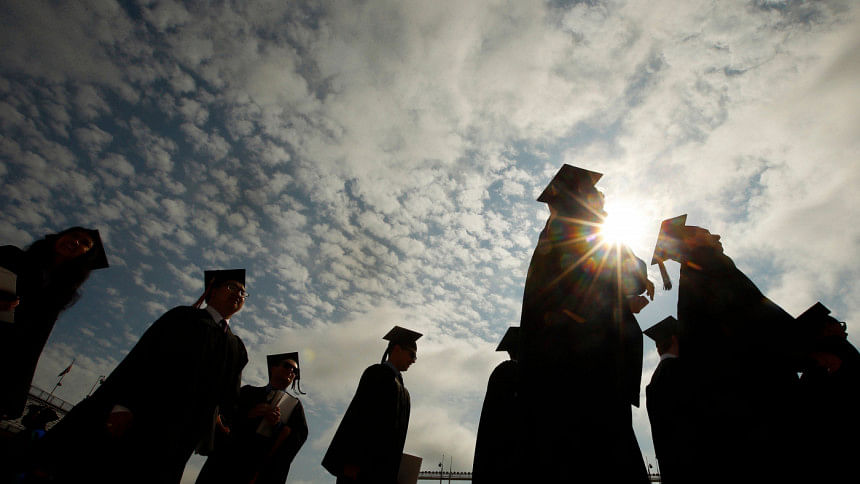Excess of graduates, dissatisfied employers, and other issues in Bangladeshi higher education

In recent years, most public and private universities in our country have been facing blistering criticism for producing unskilled graduates, accentuating grade inflation, and aggravating graduate unemployment. While public universities have regularly been in the news for political unrest, private universities have been under the spotlight for their poor education quality. Overall, our higher education sector seems to be headed in the wrong direction – for many reasons.
First, our curricula for honours and master's heavily rely on Western knowledge. A closer analysis reveals that our education system is either a mimicry of Western education or a tool for developing awareness among our students of scientific inventions and discoveries in the West. Our teachers and students follow Western scholars in every field of knowledge like science and technology, business, agriculture, sociology, psychology, philosophy, arts, and literature. Western knowledge and innovations are certainly the most advanced in the contemporary world. But while learning from western systems can be a positive, mimicking them debases the dignity of local knowledge and the significance of contextual approaches.
No nation can grow without cultivating contextual knowledge, research, and innovations. Our graduates find it difficult to relate their hard-earned knowledge to our context. And our education system fails to train them to solve problems in the context of our business, culture, and society. So, they either find themselves misfits or want to settle in Western countries.
Second, our universities have been promoting educational inflation. Consequently, our employers have been demanding credentialism. In this scenario, the young generation is caught in a maze of higher education in which they are compelled to pursue overqualification. They spend their money, time, and energy on degrees that they hardly get opportunities to use in practical life. A survey done by the Bangladesh Institute for Development Studies (BIDS) found that 66 percent of National University graduates are unemployed. Though 21 percent managed to get jobs, they were underpaid. Only three percent became entrepreneurs. The rest of them were still pursuing post-graduation.
Third, there is a gap between graduates' skills and employers' requirements. Though millions of graduates are searching for suitable jobs, employers claim a shortage of skilled employees. And there seems to be no efficient entity to address this gap. Similarly, policymakers at universities usually show more interest in building infrastructures than in addressing skill gaps and investing in faculty development, research, and innovation. So, the purpose of higher education remains ignored, and graduates fail to contribute effectively to our national economy.
Fourth, our universities are well known for producing innumerable graduates in certain popular fields like computer science and business administration. But we do not have any proper study on how many engineers, scientists, and business graduates will be essential in the upcoming years. In addition, our curricula are designed to focus heavily on theoretical and abstract elements, concentrating less on practical application. Students thus end up completing higher studies either in the nonessential fields or with irrelevant skills.
Fifth, we have a lack of research universities, research funds, and an overall lack of appreciation for researchers. Most of our universities offer course-based honours and master's programmes. These course-based programmes require students to complete only courses and sit for semester-end exams without a thesis or any research work. Though course-based programmes may sound promising for employability, they practically become devalued in actual jobs as most programmes are designed around theories and not based on practical aspects.
Regarding research funding, our universities fail to provide necessary funds and lack collaborations with potential fund providers. So, they neither offer research opportunities nor facilitate job-specific skills learning.
Worst of all, our researchers and scientists do not receive due respect and appreciation from academic institutions and policymakers. Many Bangladeshi researchers and scholars perform outstandingly during their stay in developed countries, but they hardly get opportunities or respect here. In Bangladesh, government employees seem to be more appreciated and receive more opportunities than researchers, philosophers, and scholars.
The biggest asset of our country is its human assets. The number of students getting admission to universities is increasing impressively every year. But the country's policies seem to prioritise short-term success in business and remittance. We produced thousands of unskilled labourers abroad but are failing to strengthen our backbone through effective higher education, research, and innovation.
Universities must promote research and innovations. They should prioritise researchers, innovators, and scholars over administrators. They must collaborate with relevant industries for research funds and, at the same time, provide job-specific skills and contextual knowledge to students through internships and externships. They should also consider teaching generic skills that are useful for jobs through induction training and short courses. Our universities must generate knowledge that applies to our context, and our graduates must contribute to our society, culture, and economy. They should neither have to find themselves as misfits here nor seek an opportunity to settle in developed countries.
Md Kawsar Uddin is an associate professor at the Department of English & Modern Languages of the International University of Business Agriculture and Technology (IUBAT).


 For all latest news, follow The Daily Star's Google News channel.
For all latest news, follow The Daily Star's Google News channel. 











Comments